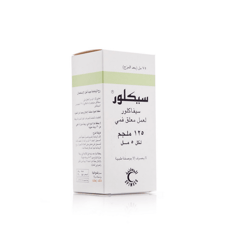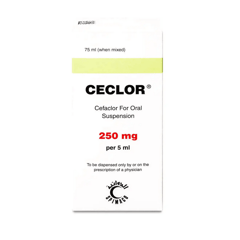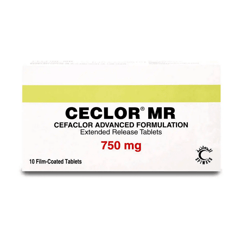Need Physician?Approval
Ceclor 500 mg Capsules

In stock
SKU :
1022-AR069
A valid medical prescription is required to dispense this medication .
Cefaclor is an antibiotic that belongs to the group of second generation Cephalosporin
1. What this product is and what it is used for
The name of your medicine is Ceclor. It contains the active ingredient Cefaclor.
Ceclor is an antibiotic used to treat infections in different parts of the body caused by bacteria.
Ceclor belongs to a group of antibiotics called cephalosporins. These antibiotics work by
killing the bacteria that are causing your infection.
Ceclor will not work against infections caused by viruses such as colds or the flu.
Your doctor may have prescribed Ceclor for another reason.
Ask your doctor if you have any questions about why Ceclor has been prescribed for you.
2. What you need to know before you use this product
Do not take Ceclor
1.If you have an allergy to Cefaclor, any other cephalosporins or any of the ingredients
listed at the end of this leaflet.
Some of the symptoms of an allergic reaction may include wheezing, shortness of breath,
swelling of the face, lips or tongue which may cause difficulty in swallowing or breathing,
skin rash, itching or hives.
2.If you have had a serious allergic reaction to any penicillins.
You may be more likely to have an allergic reaction to Ceclor if you are allergic to penicillin
medicines.
Do not give Ceclor to a premature baby or to a baby less than one month old.
The safety and effectiveness of Ceclor have not been established in this age group.
If you are not sure whether you should start taking Ceclor, contact your doctor.
Tell your doctor if:
-You have had any type of allergic reaction to any penicillin medicines.
You may have an increased chance of being allergic to Ceclor if you are allergic to penicillins.
-You have any allergies to:
• Any other medicines.
• Any other substances, such as foods, preservatives or dyes.
- If you have or have had any medical conditions, including:
• Kidney problems.
• Stomach or bowel problems.
• Liver problems.
If you have not told your doctor about any of the above, tell them before you take Ceclor.
While you are using Ceclor
Things you must do
If the symptoms of your infection do not improve within a few days, or if they become worse,
tell your doctor.
If you get severe diarrhoea, tell your doctor or pharmacist immediately. Do this even if it occurs
several weeks after Ceclor has been stopped.
Diarrhoea may mean that you have a serious condition affecting your bowel. You may need
urgent medical care. Do not take any diarrhoea medicine without first checking with your
doctor.
If you get a sore white mouth or tongue while taking or soon after stopping Ceclor, tell your
doctor. Also tell your doctor if you get vaginal itching or discharge.
This may mean you have a fungal infection called thrush. Sometimes the use of Ceclor allows
fungi to grow and the above symptoms to occur. Ceclor does not work against fungi.
If you are about to start taking any new medicine, tell your doctor and pharmacist that you are
taking Ceclor.
If you have to test your urine for sugar while you are being given Ceclor, make sure your doctor
knows which type of test you use.
Ceclor may affect the results of some of these tests.
If you have to have any blood tests tell your doctor you are taking Ceclor.
Ceclor may affect the results of some blood tests.
Taking other medicines
Tell your doctor or pharmacist if you are taking any other medicines, including any medicines
that you buy without a prescription from your pharmacy, supermarket or health food shop.
Some medicines may interfere with Ceclor. These include:
• Probenecid, a medicine used to treat gout These medicines may be affected by Ceclor , or may
affect how well it works. You may need to take different amounts of your medicine, or you may
need to take different medicines.
Your doctor will advise you.
Talk to your doctor about the need for an additional method of contraception while
taking Ceclor.
Some antibiotics may decrease the effectiveness of some birth control pills.
Your doctor and pharmacist have more information on medicines to be careful with or avoid
while taking Ceclor.
Taking Ceclor with food and drink
Ceclor can be taken with or without food.
Pregnancy and breastfeeding
Ceclor may affect your developing baby if you take it during pregnancy. Your doctor will
discuss the risks and benefits of using Ceclor during pregnancy.
Ceclor passes into breast milk and may affect your baby. Your doctor will discuss the risks and
benefits of using Ceclor when breastfeeding.
Driving and using machines
Be careful driving or operating machinery until you know how Ceclor affects you.
Ceclor may cause drowsiness and dizziness in some people. Make sure you know how you
react to Ceclor before you drive a car, operate machinery or do anything else that may be
dangerous if you are affected.
Children should be careful when riding bicycles or climbing trees.
Important information about some of the ingredients of Ceclor suspension:
Ceclor suspension contains sucrose, if you have been told by your doctor that you have
intolerance to some sugars, please contact your doctor before taking this medicine.
Caution in diabetic patients:
Ceclor 125MG Powder for Oral Suspensions: each 5 ml of reconstituted suspension contains
3.005 g of sucrose.
Ceclor 250MG Powder for Oral Suspensions: each 5 ml of reconstituted suspension contains
2.871 g of sucrose.
3. How to use this product.
Follow all directions given to you by your doctor or pharmacist carefully.
These directions may differ from the information contained in this leaflet.
If you do not understand the instructions on the container, ask your doctor or pharmacist
for help.
Adults
The usual dose of Ceclor is 250 mg every 8 to 12 hours. This dose may vary depending on your
condition.
Children
The dose for children varies according to the age of the child, their weight and the type of
infection.
Your doctor and pharmacist will tell you the right amount to give your child.
Ceclor Suspension
Always shake the bottle before measuring the correct volume to be taken using a metric
medicine measure.
125mg/5ml 250mg/5ml
<1 year (9kg) 2.5ml tid
1 - 5 years (9 - 18kg) 5.0ml tid
Over 5 years 5.0ml tid
How long to take it
Continue taking this medicine until you finish the bottle or for as long as your doctor tells you.
Keep taking this medicine for the full course of treatment, even if you begin to feel better after
a few days.
If you do not complete the full course prescribed by your doctor, the infection may not clear
completely or your symptoms may return.
Do not stop taking your Ceclor because you are feeling better, unless advised by your
doctor.
If you do not complete the full course prescribed by your doctor, all of the bacteria causing your
infection may not be killed. These bacteria may continue to grow and multiply so that your
infection may not clear completely or it may return.
If you forget to take it
If it is almost time for your next dose, skip the dose you missed and take your next dose when
you are meant to.
Otherwise, take it as soon as you remember, and then go back to taking your suspension as you
would normally.
Do not take a double dose to make up for the dose that you missed.
If you are not sure what to do ask your doctor or pharmacist.
If you take too much (overdose)
Immediately telephone your doctor or Poisons Information Centre or go to Accident and
Emergency at your nearest hospital, if you think that you or anyone else may have taken too
much Ceclor. Do this even if there are no signs of discomfort or poisoning. You may need
urgent medical attention.
If you have taken too much Ceclor you may experience symptoms such as feeling sick in the
stomach, vomiting or diarrhoea.
4. Possible side effects
Like all medicines Ceclor can cause side effects, although not everybody gets them.
While taking Ceclor
Tell your doctor if you notice any of the following and they worry you:
•Oral thrush - white, furry, sore tongue and mouth.
•Vaginal thrush - sore and itchy vagina and/or discharge.
•Mild diarrhoea.
• Feeling sick.
•Vomiting.
•Dizziness, drowsiness.
•Headache.
•Nervousness, hyperactivity.
• Inability to sleep.
These side effects are usually mild.
If any of the following happen, stop taking Ceclor and tell your doctor immediately or go
to accident and Emergency at your nearest hospital:
• Severe abdominal cramps or stomach cramps.
•Watery and severe diarrhoea, which may also be bloody or contain mucus.
•Rash, itching, severe body rash.
•With pinkish, itchy swellings of the skin (hives), blistering or peeling of the skin
• Signs of frequent infections such as fever, chills, sore throat or mouth ulcers
• Pain or swelling of the joints
•Yellowing of the skin or eyes.
• Shortness of breath, wheezing or difficulty in breathing
• Swelling of the face, lips or tongue which may cause difficulty in swallowing or breathing.
• Severe blisters and bleeding of the lips, eyes, mouth, nose and genitals
•Unusual muscle stiffness causing poor control of movement
•Confusion, hallucinations
•Kidney pain, blood in the urine, passing more or less urine than is normal for you
These are very serious side effects. You may need urgent medical attention or hospitalisation.
Serious side effects are rare.
After taking Ceclor
Tell your doctor immediately if you notice any of the following side effects, particularly if
they occur several weeks after stopping treatment with Ceclor :
• Severe abdominal cramps or stomach cramps.
•Watery and severe diarrhoea, which may also be bloody.
• Fever, in combination with one or both of the above.
These are rare but serious side effects. You may have a serious condition affecting your bowel.
Therefore, you may need urgent medical attention. However, this side effect is rare.
Do not take any diarrhoea medicine without first checking with your doctor.
Other side effects not listed above may also occur in some patients.
Tell your doctor if you notice anything making you feel unwell.
Do not be alarmed by this list of possible side effects. You may not experience any of them.
5. How to store this product
Keep out of the reach and sight of children.
For Ceclor capsules Do not storeabove30° C.
For Ceclor Powder for Oral Suspensions; Do not Store above 30° C. Keep containers tightly
closed and protect from light. After reconstitution, the suspension should be stored in a
refrigerator (2 8°C) and be used within 14 days.
Store in the original package.
Do not use Ceclor after the expiry date which is stated on the container. The expiry date refers
to the last day of that month.
.
1. What this product is and what it is used for
The name of your medicine is Ceclor. It contains the active ingredient Cefaclor.
Ceclor is an antibiotic used to treat infections in different parts of the body caused by bacteria.
Ceclor belongs to a group of antibiotics called cephalosporins. These antibiotics work by
killing the bacteria that are causing your infection.
Ceclor will not work against infections caused by viruses such as colds or the flu.
Your doctor may have prescribed Ceclor for another reason.
Ask your doctor if you have any questions about why Ceclor has been prescribed for you.
2. What you need to know before you use this product
Do not take Ceclor
1.If you have an allergy to Cefaclor, any other cephalosporins or any of the ingredients
listed at the end of this leaflet.
Some of the symptoms of an allergic reaction may include wheezing, shortness of breath,
swelling of the face, lips or tongue which may cause difficulty in swallowing or breathing,
skin rash, itching or hives.
2.If you have had a serious allergic reaction to any penicillins.
You may be more likely to have an allergic reaction to Ceclor if you are allergic to penicillin
medicines.
Do not give Ceclor to a premature baby or to a baby less than one month old.
The safety and effectiveness of Ceclor have not been established in this age group.
If you are not sure whether you should start taking Ceclor, contact your doctor.
Tell your doctor if:
-You have had any type of allergic reaction to any penicillin medicines.
You may have an increased chance of being allergic to Ceclor if you are allergic to penicillins.
-You have any allergies to:
• Any other medicines.
• Any other substances, such as foods, preservatives or dyes.
- If you have or have had any medical conditions, including:
• Kidney problems.
• Stomach or bowel problems.
• Liver problems.
If you have not told your doctor about any of the above, tell them before you take Ceclor.
While you are using Ceclor
Things you must do
If the symptoms of your infection do not improve within a few days, or if they become worse,
tell your doctor.
If you get severe diarrhoea, tell your doctor or pharmacist immediately. Do this even if it occurs
several weeks after Ceclor has been stopped.
Diarrhoea may mean that you have a serious condition affecting your bowel. You may need
urgent medical care. Do not take any diarrhoea medicine without first checking with your
doctor.
If you get a sore white mouth or tongue while taking or soon after stopping Ceclor, tell your
doctor. Also tell your doctor if you get vaginal itching or discharge.
This may mean you have a fungal infection called thrush. Sometimes the use of Ceclor allows
fungi to grow and the above symptoms to occur. Ceclor does not work against fungi.
If you are about to start taking any new medicine, tell your doctor and pharmacist that you are
taking Ceclor.
If you have to test your urine for sugar while you are being given Ceclor, make sure your doctor
knows which type of test you use.
Ceclor may affect the results of some of these tests.
If you have to have any blood tests tell your doctor you are taking Ceclor.
Ceclor may affect the results of some blood tests.
Taking other medicines
Tell your doctor or pharmacist if you are taking any other medicines, including any medicines
that you buy without a prescription from your pharmacy, supermarket or health food shop.
Some medicines may interfere with Ceclor. These include:
• Probenecid, a medicine used to treat gout These medicines may be affected by Ceclor , or may
affect how well it works. You may need to take different amounts of your medicine, or you may
need to take different medicines.
Your doctor will advise you.
Talk to your doctor about the need for an additional method of contraception while
taking Ceclor.
Some antibiotics may decrease the effectiveness of some birth control pills.
Your doctor and pharmacist have more information on medicines to be careful with or avoid
while taking Ceclor.
Taking Ceclor with food and drink
Ceclor can be taken with or without food.
Pregnancy and breastfeeding
Ceclor may affect your developing baby if you take it during pregnancy. Your doctor will
discuss the risks and benefits of using Ceclor during pregnancy.
Ceclor passes into breast milk and may affect your baby. Your doctor will discuss the risks and
benefits of using Ceclor when breastfeeding.
Driving and using machines
Be careful driving or operating machinery until you know how Ceclor affects you.
Ceclor may cause drowsiness and dizziness in some people. Make sure you know how you
react to Ceclor before you drive a car, operate machinery or do anything else that may be
dangerous if you are affected.
Children should be careful when riding bicycles or climbing trees.
Important information about some of the ingredients of Ceclor suspension:
Ceclor suspension contains sucrose, if you have been told by your doctor that you have
intolerance to some sugars, please contact your doctor before taking this medicine.
Caution in diabetic patients:
Ceclor 125MG Powder for Oral Suspensions: each 5 ml of reconstituted suspension contains
3.005 g of sucrose.
Ceclor 250MG Powder for Oral Suspensions: each 5 ml of reconstituted suspension contains
2.871 g of sucrose.
3. How to use this product.
Follow all directions given to you by your doctor or pharmacist carefully.
These directions may differ from the information contained in this leaflet.
If you do not understand the instructions on the container, ask your doctor or pharmacist
for help.
Adults
The usual dose of Ceclor is 250 mg every 8 to 12 hours. This dose may vary depending on your
condition.
Children
The dose for children varies according to the age of the child, their weight and the type of
infection.
Your doctor and pharmacist will tell you the right amount to give your child.
Ceclor Suspension
Always shake the bottle before measuring the correct volume to be taken using a metric
medicine measure.
125mg/5ml 250mg/5ml
<1 year (9kg) 2.5ml tid
1 - 5 years (9 - 18kg) 5.0ml tid
Over 5 years 5.0ml tid
How long to take it
Continue taking this medicine until you finish the bottle or for as long as your doctor tells you.
Keep taking this medicine for the full course of treatment, even if you begin to feel better after
a few days.
If you do not complete the full course prescribed by your doctor, the infection may not clear
completely or your symptoms may return.
Do not stop taking your Ceclor because you are feeling better, unless advised by your
doctor.
If you do not complete the full course prescribed by your doctor, all of the bacteria causing your
infection may not be killed. These bacteria may continue to grow and multiply so that your
infection may not clear completely or it may return.
If you forget to take it
If it is almost time for your next dose, skip the dose you missed and take your next dose when
you are meant to.
Otherwise, take it as soon as you remember, and then go back to taking your suspension as you
would normally.
Do not take a double dose to make up for the dose that you missed.
If you are not sure what to do ask your doctor or pharmacist.
If you take too much (overdose)
Immediately telephone your doctor or Poisons Information Centre or go to Accident and
Emergency at your nearest hospital, if you think that you or anyone else may have taken too
much Ceclor. Do this even if there are no signs of discomfort or poisoning. You may need
urgent medical attention.
If you have taken too much Ceclor you may experience symptoms such as feeling sick in the
stomach, vomiting or diarrhoea.
4. Possible side effects
Like all medicines Ceclor can cause side effects, although not everybody gets them.
While taking Ceclor
Tell your doctor if you notice any of the following and they worry you:
•Oral thrush - white, furry, sore tongue and mouth.
•Vaginal thrush - sore and itchy vagina and/or discharge.
•Mild diarrhoea.
• Feeling sick.
•Vomiting.
•Dizziness, drowsiness.
•Headache.
•Nervousness, hyperactivity.
• Inability to sleep.
These side effects are usually mild.
If any of the following happen, stop taking Ceclor and tell your doctor immediately or go
to accident and Emergency at your nearest hospital:
• Severe abdominal cramps or stomach cramps.
•Watery and severe diarrhoea, which may also be bloody or contain mucus.
•Rash, itching, severe body rash.
•With pinkish, itchy swellings of the skin (hives), blistering or peeling of the skin
• Signs of frequent infections such as fever, chills, sore throat or mouth ulcers
• Pain or swelling of the joints
•Yellowing of the skin or eyes.
• Shortness of breath, wheezing or difficulty in breathing
• Swelling of the face, lips or tongue which may cause difficulty in swallowing or breathing.
• Severe blisters and bleeding of the lips, eyes, mouth, nose and genitals
•Unusual muscle stiffness causing poor control of movement
•Confusion, hallucinations
•Kidney pain, blood in the urine, passing more or less urine than is normal for you
These are very serious side effects. You may need urgent medical attention or hospitalisation.
Serious side effects are rare.
After taking Ceclor
Tell your doctor immediately if you notice any of the following side effects, particularly if
they occur several weeks after stopping treatment with Ceclor :
• Severe abdominal cramps or stomach cramps.
•Watery and severe diarrhoea, which may also be bloody.
• Fever, in combination with one or both of the above.
These are rare but serious side effects. You may have a serious condition affecting your bowel.
Therefore, you may need urgent medical attention. However, this side effect is rare.
Do not take any diarrhoea medicine without first checking with your doctor.
Other side effects not listed above may also occur in some patients.
Tell your doctor if you notice anything making you feel unwell.
Do not be alarmed by this list of possible side effects. You may not experience any of them.
5. How to store this product
Keep out of the reach and sight of children.
For Ceclor capsules Do not storeabove30° C.
For Ceclor Powder for Oral Suspensions; Do not Store above 30° C. Keep containers tightly
closed and protect from light. After reconstitution, the suspension should be stored in a
refrigerator (2 8°C) and be used within 14 days.
Store in the original package.
Do not use Ceclor after the expiry date which is stated on the container. The expiry date refers
to the last day of that month.
.
| Offer Label | Need Physician?Approval |
|---|---|
| Shipping Type | Express |
Write Your Own Review
The largest selection of casino games and sports bets at 1xbet app.






